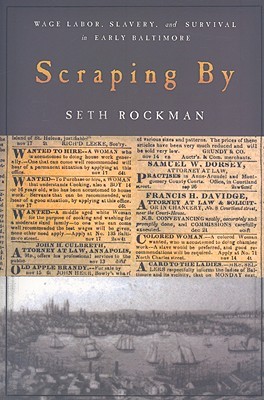| Scraping by: Wage Labor, Slavery, and Survival in Early Baltimore Contributor(s): Rockman, Seth (Author) |
|
 |
ISBN: 0801890071 ISBN-13: 9780801890079 Publisher: Johns Hopkins University Press OUR PRICE: $30.40 Product Type: Paperback - Other Formats Published: December 2008 |
| Additional Information |
| BISAC Categories: - Business & Economics | Labor - History | United States - State & Local - Middle Atlantic (dc, De, Md, Nj, Ny, Pa) |
| Dewey: 331.109 |
| LCCN: 2008011847 |
| Series: Studies in Early American Economy and Society from the Library Company of Philadelphia (Paperback) |
| Physical Information: 1.2" H x 6" W x 8.9" (1.20 lbs) 392 pages |
| Descriptions, Reviews, Etc. |
| Publisher Description: Enslaved mariners, white seamstresses, Irish dockhands, free black domestic servants, and native-born street sweepers all navigated the low-end labor market in post-Revolutionary Baltimore. Seth Rockman considers this diverse workforce, exploring how race, sex, nativity, and legal status determined the economic opportunities and vulnerabilities of working families in the early republic. In the era of Frederick Douglass, Baltimore's distinctive economy featured many slaves who earned wages and white workers who performed backbreaking labor. By focusing his study on this boomtown, Rockman reassesses the roles of race and region and rewrites the history of class and capitalism in the United States during this time. Rockman describes the material experiences of low-wage workers--how they found work, translated labor into food, fuel, and rent, and navigated underground economies and social welfare systems. He also explores what happened if they failed to find work or lost their jobs. Rockman argues that the American working class emerged from the everyday struggles of these low-wage workers. Their labor was indispensable to the early republic's market revolution, and it was central to the transformation of the United States into the wealthiest society in the Western world. Rockman's research includes construction site payrolls, employment advertisements, almshouse records, court petitions, and the nation's first "living wage" campaign. These rich accounts of day laborers and domestic servants illuminate the history of early republic capitalism and its consequences for working families. |
Contributor Bio(s): Rockman, Seth: - Seth Rockman is an assistant professor of history at Brown University and author of Welfare Reform in the Early Republic. |